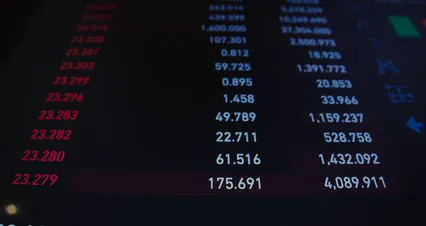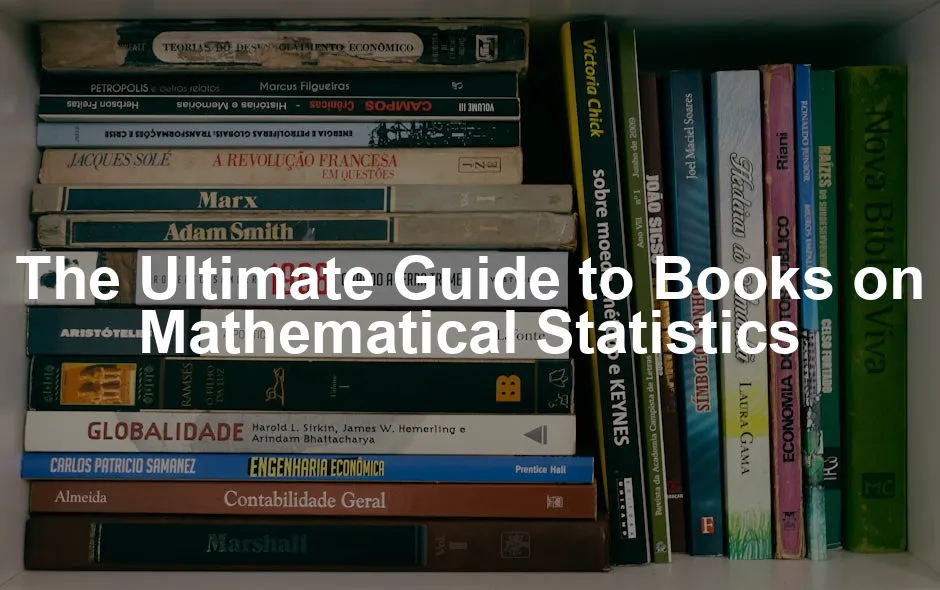Introduction
Mathematical statistics is the backbone of data analysis. It combines statistical theory and mathematical methods to interpret and draw conclusions from data. This field shines in various domains, including data science, economics, and research, where informed decisions hinge on statistical insights. In an age where data reigns supreme, understanding mathematical statistics is crucial for transforming raw numbers into actionable knowledge. Learn more about its applications here.
Mathematical statistics is essential for data-driven decision making. Discover its applications in various fields.
Selecting the right textbooks is like choosing a trusty GPS for your statistical journey. With countless options available, it can be overwhelming to find the perfect guide tailored to your needs. A well-chosen textbook can simplify complex theories and enhance understanding. Quality resources not only provide foundational knowledge but also introduce advanced concepts, making them indispensable for learners at any level.
This article aims to be your roadmap, offering a comprehensive list of recommended books on mathematical statistics. We’ll highlight unique features of each title, making it easier for you to choose the best fit for your learning style. Whether you’re a beginner or looking to deepen your knowledge, this guide will help you navigate the vast landscape of mathematical statistics literature. Let’s turn those daunting statistics into a delightful read!

Understanding Mathematical Statistics
What is Mathematical Statistics?
Mathematical statistics is a branch of statistics that applies mathematical theories and principles to analyze data. It encompasses the formulation of statistical models, estimation of parameters, and testing of hypotheses. The scope of mathematical statistics extends to various methodologies, including point estimation, interval estimation, and hypothesis testing. These techniques empower researchers to make data-driven decisions, predict outcomes, and infer relationships between variables. For more on statistical models, check this guide on statistical models.
Mathematical statistics involves various methodologies for data analysis. Explore more about statistical models and their applications.
In the real world, mathematical statistics finds its application across numerous sectors. For instance, in healthcare, it aids in analyzing clinical trial data to evaluate treatment effectiveness. In economics, it helps in assessing market trends and consumer behavior through data analysis. Moreover, businesses leverage statistical methods to optimize operations and enhance decision-making processes. This versatile tool equips professionals with the ability to interpret complex information, making it essential in today’s data-driven landscape.
Understanding mathematical statistics opens doors to a plethora of opportunities. It fosters critical thinking and enables individuals to tackle real-world problems with confidence. With its wide-ranging applications, mastering mathematical statistics is not just beneficial—it’s necessary for success in many fields.

Importance of Studying Mathematical Statistics
Mathematical statistics plays a pivotal role in data analysis and decision-making. It equips individuals with the necessary tools to interpret complex data sets effectively. Imagine you’re a business owner trying to decipher customer trends. Understanding mathematical statistics helps you make informed decisions based on actual data rather than gut feelings. It’s like having a compass in a foggy forest—guiding you toward clearer insights.
In academic research, the significance of mathematical statistics is just as pronounced. Researchers rely on statistical methods to validate their hypotheses and draw conclusions. Whether it’s a groundbreaking medical study or an economic forecast, mathematical statistics provides the framework to analyze data rigorously. Without it, conclusions could be as shaky as a wobbly table at a restaurant.
Moreover, various professional fields benefit immensely from mathematical statistics. In finance, analysts utilize statistical techniques to assess risks and returns. In healthcare, statisticians evaluate the effectiveness of treatments using clinical trial data. Even in sports, teams analyze player performance statistics to make strategic decisions. It’s clear: mathematical statistics is not just a subject; it’s a vital skill that transcends disciplines. For more insights on effective data analysis, see our article on data analysis techniques.
Mathematical statistics is vital for informed decision-making in various fields. Learn about effective data analysis techniques.
The ability to analyze and interpret data is increasingly essential in today’s world, where data is generated at an unprecedented rate. Mastering mathematical statistics opens up a treasure chest of opportunities, arming individuals with skills to tackle real-world problems confidently. Thus, investing time in studying this field is not just beneficial—it’s a smart move for anyone looking to thrive in the data-driven age.

Recommended Textbooks for Beginners
Essential Foundations
1. “Statistics for People Who (Think They) Hate Statistics” by Neil J. Salkind
This book cleverly addresses the common fears associated with statistics. Salkind’s witty approach makes the subject less intimidating and more enjoyable. He uses relatable examples and humor to explain complex concepts. Key topics include descriptive statistics, probability, and hypothesis testing. Readers will appreciate the straightforward language and engaging style, making it an excellent choice for beginners. Plus, you can grab your copy here!

2. “Introductory Statistics” by Barbara Illowsky and Susan Dean
Illowsky and Dean’s “Introductory Statistics” is a treasure trove of accessibility and practicality. This textbook is designed for learners at various levels, focusing on real-life applications of statistical concepts. Readers will find interactive elements such as exercises and case studies. The authors emphasize the importance of statistics in everyday life, making it relatable and relevant. It’s a fantastic starting point for those new to the field. You can find it here.

Transitioning to Intermediate Level
3. “Introduction to Mathematical Statistics” by Hogg, McKean, and Craig
This classic textbook serves as a bridge to more advanced studies in mathematical statistics. Hogg, McKean, and Craig provide a comprehensive overview of estimation, hypothesis testing, and statistical inference. The structured approach allows for a gradual increase in complexity, making it suitable for those who have grasped the basics. With ample examples and exercises, readers will find it an invaluable resource as they progress in their studies. Get your copy here.

Advanced Textbooks for Graduate Students
In-Depth Studies
5. “Theory of Point Estimation” by Lehmann and Casella
Lehmann and Casella’s “Theory of Point Estimation” is a cornerstone text in estimation theory. This book meticulously discusses various estimation techniques, providing a comprehensive overview of point estimators. It covers the properties of estimators, including unbiasedness, consistency, and efficiency. The inclusion of Cramér-Rao bounds adds rigor to the discussions, making it an invaluable resource for understanding the theoretical underpinnings of estimation. You can secure your copy here.
This textbook stands out for its clarity and systematic approach, combining mathematical rigor with practical examples. It’s perfect for graduate students who wish to delve into the intricacies of estimation methods, preparing them for real-world applications. The exercises at the end of each chapter encourage hands-on practice, reinforcing the concepts discussed. If you’re eager to grasp the nuances of estimation theory, this book is a must-have.

6. “Testing Statistical Hypotheses” by Lehmann and Romano
Another gem by Lehmann, this time co-authored with Romano, is “Testing Statistical Hypotheses.” This book lays down the foundation for hypothesis testing, explaining the various methodologies used in statistical inference. The authors cover classic tests like t-tests and chi-square tests while also addressing more advanced concepts, such as likelihood ratio tests. For a quick reference, you can check out our hypothesis testing cheat sheet.
Understanding hypothesis testing is crucial for data analysis. Refer to our cheat sheet for a comprehensive overview.
What makes this book particularly engaging is its focus on both the theoretical aspects and practical applications of hypothesis testing. With a plethora of examples and exercises, it ensures that students not only understand the theory but can also apply it confidently in real-world scenarios. The clear explanations and structured layout make this textbook an excellent choice for graduate students aiming to master the art of hypothesis testing. You can find it here.

Specialized Topics
7. “Asymptotic Statistics” by van der Vaart
Asymptotic statistics is a crucial area of study within statistical theory, and van der Vaart’s book is a definitive guide to this topic. This textbook delves into asymptotic theory, focusing on the properties of estimators and test statistics as the sample size approaches infinity. It emphasizes concepts like convergence and the central limit theorem, providing a solid foundation for understanding advanced statistical inference.
What sets this book apart is its rigorous yet approachable treatment of asymptotics. Van der Vaart employs a wealth of examples and exercises to illustrate complex concepts, making it accessible to both students and researchers. For those looking to explore the elegant world of asymptotic methods and their applications, this book is an essential resource. Get it here.

Specialized Books and Resources
Books for Specific Applications
9. “Mathematical Statistics: Basic Ideas and Selected Topics” by Bickel and Doksum
This book strikes a delightful balance between theory and practical examples. Bickel and Doksum present statistical concepts in an accessible manner. They simplify complex ideas, making them digestible for students. The authors emphasize real-world applications, ensuring that readers understand how to apply their knowledge. Purchase it here.
The book covers fundamental topics like estimation, hypothesis testing, and regression analysis. Each chapter is filled with helpful examples and exercises that reinforce learning. The authors also highlight nonparametric methods, a particularly useful aspect for those interested in flexible models.
Readers appreciate the clear explanations and the engaging writing style. This text is perfect for students who want to grasp both the theoretical and practical sides of mathematical statistics.

10. “Statistical Decision Theory and Bayesian Analysis” by Berger
Berger’s work introduces readers to the Bayesian approach to statistics, a hot topic in today’s data-driven world. This book highlights the importance of decision-making under uncertainty, which is crucial for many fields. Berger’s style is both rigorous and approachable, making complex concepts understandable. You can find it here.
The text provides a comprehensive overview of Bayesian methods, including prior distributions and posterior analysis. It also covers concepts such as loss functions and decision rules. By incorporating real-world examples, Berger shows how these methods apply in various scenarios, including medical decision-making and risk assessment.
This book is highly regarded for its clarity and depth. It’s an excellent resource for those looking to deepen their understanding of Bayesian statistics and its applications. For a fun introduction to Bayesian concepts, check out this guide on Bayesian statistics.

Additional Resources
For those eager to learn beyond traditional textbooks, several online platforms offer valuable courses and materials. Websites like Coursera and edX feature courses on mathematical statistics from renowned universities. These platforms provide flexibility, allowing learners to study at their own pace.
Additionally, many resources are available as free PDFs. Websites like Project Gutenberg and various university repositories house a wealth of statistical literature. These materials can supplement your learning and provide diverse perspectives on mathematical statistics.
Engaging with these resources will enhance your understanding and application of statistical methods, setting you up for success in your studies and future career.

User Recommendations and Community Insights
When it comes to selecting textbooks on mathematical statistics, the online community has a wealth of recommendations and insights. Platforms like Reddit and Stack Exchange are buzzing with discussions about effective learning materials. Users often share opinions on their favorite textbooks and how these resources have shaped their understanding of the subject.
One common sentiment is the recommendation of “Statistical Inference” by Casella and Berger. A user noted, “This book has been my go-to for years. It strikes the perfect balance between theory and application.” Many find that it provides a solid foundation, making complex concepts more digestible. Another user chimed in, stating, “If you want rigor without losing your mind, this is the one.” You can check it out here.
Lehmann and Romano’s “Testing Statistical Hypotheses” also gets a lot of love. One user remarked, “It’s a classic! The explanations are clear, and the examples are spot on.” This sentiment resonates with many who appreciate its thorough approach to hypothesis testing.
For beginners, “Statistics for People Who (Think They) Hate Statistics” by Neil J. Salkind frequently pops up in discussions. A user exclaimed, “Salkind’s humor makes stats feel less intimidating! I wish I had this book when I started.” This book is praised for its engaging style, making it an excellent entry point for those new to the field.
Other noteworthy mentions include “Introduction to Mathematical Statistics” by Hogg, McKean, and Craig. Users appreciate its structured approach as a stepping stone to more advanced texts. One reader shared, “I started with this book, and it prepared me well for tougher material.” You can grab it here.
Additionally, “Mathematical Statistics with Applications” by Wackerly et al. is often highlighted for its practical focus. A user noted, “It’s great for those who want to apply statistics in real-life scenarios. I found the case studies particularly helpful.” You can find it here.
The community’s consensus emphasizes the importance of personal learning style when choosing a textbook. Users suggest considering what works best for you—be it a rigorous mathematical approach or a more relatable, application-focused style. This flexibility allows learners to find resources that resonate with their unique needs.
In conclusion, the collective wisdom from various online forums reflects a diverse range of experiences. Whether you’re a beginner or an advanced learner, there’s a textbook out there that can guide you through the complexities of mathematical statistics. Don’t hesitate to tap into these recommendations as you embark on your statistical journey!

Conclusion
Choosing the right textbook is crucial for mastering mathematical statistics. With a plethora of options available, the task may feel daunting. However, the right book can illuminate complex topics, making them accessible and engaging.
The recommendations discussed in this article cater to various levels of expertise. Beginners might find joy in Neil J. Salkind’s humorous approach, while advanced learners can benefit from the rigor of Casella and Berger’s works. Each recommended title offers unique insights and practical applications that can enhance your understanding.
As you embark on your statistical studies, consider your learning preferences. Do you thrive on rigorous theory, or do you prefer relatable examples? Aligning your choice with your personal learning style can make a world of difference.
We encourage readers to dive into these recommended books. They can serve as invaluable resources, guiding you through the intricacies of mathematical statistics. If you’ve had experiences with these titles or have additional recommendations, we’d love to hear from you. Share your thoughts and suggestions in the comments below!
FAQs
What is the best book for beginners in mathematical statistics?
For beginners, “Statistics for People Who (Think They) Hate Statistics” by Neil J. Salkind is highly recommended for its engaging style. Another excellent choice includes “Introductory Statistics” by Barbara Illowsky and Susan Dean, which focuses on practical applications and accessibility.
Are there any free resources available for studying mathematical statistics?
Yes! Websites like Coursera and edX offer free courses on mathematical statistics. Additionally, many universities provide free PDFs of textbooks, such as “Introduction to Mathematical Statistics” by Hogg et al. Check your local library for access to various resources.
How do I choose the right textbook for my level?
Assess your current understanding of statistics and your learning goals. If you’re a beginner, look for books that focus on foundational concepts and engage you through examples. For intermediate or advanced levels, choose texts that challenge you while providing theoretical depth.
What are the most common topics covered in mathematical statistics textbooks?
Key topics include estimation methods, hypothesis testing, regression analysis, and probability distributions. Textbooks often cover both theoretical aspects and practical applications, ensuring a well-rounded understanding of the field.
Can I self-study mathematical statistics effectively?
Absolutely! Self-study can be an effective way to learn mathematical statistics, especially with the right resources. Create a study schedule, utilize textbooks and online courses, and practice problems regularly. Seeking help from online communities can also enhance your learning experience.
Please let us know what you think about our content by leaving a comment down below!
Thank you for reading till here 🙂
All images from Pexels




